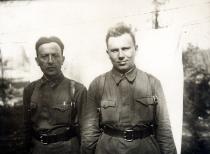Gisya Rubinchik's brother Yuda Lapis
This is my brother, Yuda Lapis, as a 2nd-year student at the Leningrad Aircraft Institute.
My brother,was born on 8th March 1921. He didn't go to cheder, because there were no more cheders after the Revolution of 1917. He studied in an ordinary Soviet school like me, with kids of various nationalities: Poles, Russians and Jews. From my childhood on I was a romantic person, taking great interest in literature and poetry. My brother loved to read, too, we had a lot of Russian books at home - purchased or borrowed from the library. We used to read even late at night.
After finishing school, Yuda went to study at the Leningrad Aircraft Institute. I entered the Medical Institute in Smolensk after secondary school but my parents decided that it was better for me to live closer to my brother. So in the winter of 1940 I found myself in Leningrad, and continued at the Medical Institute there.
When the war began, I lived in a student hostel in Leo Tolstoy Square, and my brother was staying in a hostel in Moskovsky Avenue. The war turned our lives upside down. In the beginning my brother took part in defense work in Moskovsky Avenue. The front line was very close to the hostel of the Aircraft Institute, and they built anti-tank obstacles. The hostel was in the zone of artillery bombardment, and my brother moved over to the flat of Uncle Abram, in the center of Leningrad. Uncle Abram was at the front, and his family in evacuation. The apartment was occupied by their relative, Aunt Rose, and her adopted son, Yasha. The first winter of the blockade, 1941-1942, was the most awful one. The temperature fell to 30 degrees Celsius below zero. People were starving. My brother was could not work any more. But Aunt Rose made the poor boys take out the slops and carry water to the third floor. They had to live one way or another! My brother was weaker than me, he had been suffered from a liver disease since his childhood.
I supported him as much as I could. After shifts in the hospital and lectures at the Institute, I used to walk a long way through the city in the nipping frost, and brought my relatives bread. When Aunt Rose died, and Yasha followed her shortly after, Yuda gave himself up to despair completely. Each time I came, he said, that I would be burying him on my next visit. I remember him lying there, unable to get up any more, wasting away in front of my eyes, and I tried to convince him, 'Come on, Yuda, brace yourself up, this nightmare will be over soon'. But on 14th March 1942 I found him dead. A few days before, on 8th March, he had turned 21. I buried him myself.












